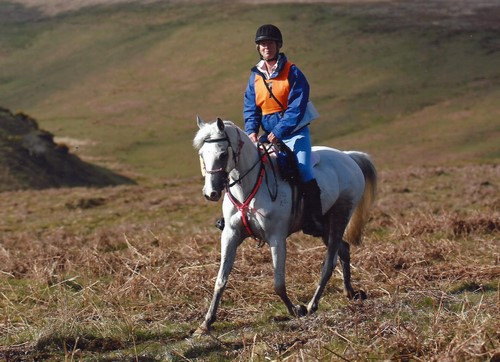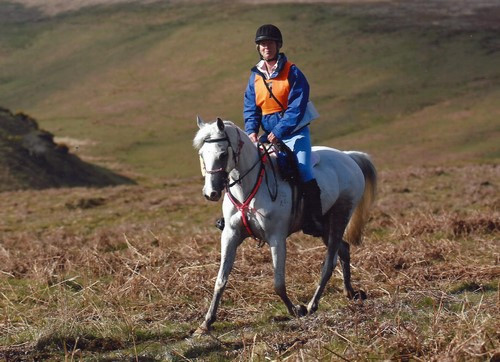Today I said goodbye to my favourite endurance mare. She was a little Arabian with a kind, big-hearted attitude to life; she carried me over the famous 160km Golden Horseshoe course and galloped her heart out racing to the finish in an International 120km at Cirencester. She always gave me all she had in the 10 years she was competing for me. It was a tough decision to make, especially as she wasn’t in an immediate state of near-death. But she was suffering with chronic arthritic changes in all four limbs, and I suspect in her spine as well, she had a tumour that was getting bigger and she was losing weight, where her life’s ambition had always been to succeed as the fattest horse to ever cover 100 miles!
In recent weeks, I have seen a number of older horses in my role as McTimoney therpaist. In most cases I have been able to offer some treatment, advice on ongoing care and seen an improvement in each horse’s wellbeing as a result. However, there has also been another case where the only advice I could give the owner was to call her vet, and let the horse go. The owner knew in her heart that was the right decision but perhaps she needed to know she had tried everything else first.
So what can each and every one of us do to ensure that our horses’ last years are as comfortable as possible? And how do we know when the time has come to let them go? Firstly, recognise that age is just a number. By this, I mean that every horse is different. A horse can be “aged” at 15, 25 or 35 years old – it really is variable. Obviously mileage on the legs of competition horses will predispose a horse to more arthritic changes and compensatory issues than might be the case with a pleasure horse, although this is a generalisation in itself and individuals vary. So what I’m really saying is this; judge your horse not on his age, but on his condition, attitude and behaviour!
Older horses need as much care and attention as younger ones. Even if your horse isn’t competing any more, they still require regular checks for sharp teeth or dental issues; back checks, particularly if they have compensatory patterns of movement from old injuries or are still in work; foot care, whether shod or barefoot; and saddle fitting checks as the back tends to dip as the paravertebral back musculature weakens with age.
Older horses put out to pasture still need to be regularly brought in, handled and cleaned up to ensure that cuts and sores are dealt with in a timely manner and to properly monitor overall condition. Older horses should NOT be allowed to get FAT. Increased weight on the joints increases pain perception markedly in people and this is likely to be the case in horses as well. I have seen several instances where a once fat older horse has a new lease of life, and vast reduction in injuries or symptoms, once they have returned to a normal weight again.
So how do you know when the time has come? Clearly if the veterinary advice is that it is kinder to let the horse go, then this advice is usually best followed. While there are many medications, operations and procedures available to us that can prolong life, if they do not promote improved comfort for the horse then it is more ethical to let the horse go, than prolong any suffering.
Behavioural changes such as uncharacteristic grumpiness, lack of interest in feeding properly, and disinterest in normal environmental stimuli, are all signs that the horse could be dealing with increased perception of pain. Veterinary advice should be sought to rule out any conditions that might respond well to treatment. Sometimes these behavioural symptoms present themselves very quickly, but in many cases the onset is slow and insidious and so it is some time before we realise that actually the horse doesn’t seem very happy any more. Where the diagnosis is due to age-related conditions that won’t respond to treatment and will slowly deteriorate, it is then a matter of time. Now it is up to you to decide; to choose the best time for your horse and for you…
I chose a warm sunny day with a gentle breeze, the birds calling over the sound of the next farm’s cows in their barns, and fresh grass in Mimi’s tummy….












